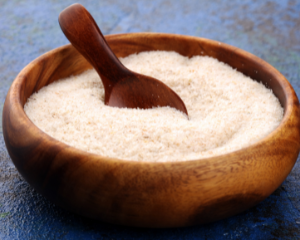Psyllium, water, and constipation
Besides keeping your bowel movements regular, psyllium husk has the ability to soften your stool provided you drink enough water. This can come in handy with constipation. Used in this way, it can prevent other complications of constipation, such as hemorrhoids and anal fissures.
Dosage
Daily dose differs from person to person: Start by taking 1/2 tsp daily in 6oz water for 1 week. If this dose doesn’t seem to be changing anything noticeable, then move up to 1 tsp daily and so on. Any time we add something new to our routine, we should start slowly and build up. Our body needs time to adjust.
Typically, it is recommended you take psyllium one to three times per day with a full glass of water. However, sometimes soluble fiber like psyllium can make symptoms like constipation worse for some people. We have found in our clinic, that taking too much when you start is the reason for this. Start low and work your way up.
For added fibre
Psyllium husk benefits various parts of the human body, namely the digestive system, the heart and pancreas. Psyllium is a herb high in soluble fibre used to form bulk in your stool.
For digestive health
A bulk-forming laxative different from stool softeners (or stimulant laxatives). Bulk-forming laxatives help the bowels retain water and lubricate the stool. Stimulant laxatives over-stimulate the nerves that speed up bowel movement through the intestines – that’s right – stimulant laxatives cause diarrhea! They dehydrate instead of lubricate.
Psyllium soaks up water in your gut and makes bowel movements easier. It can help promote regularity or used as a one-off to ease constipation, and can be added to your regular routine to help promote overall digestive health. Just be careful not to take too much! In this rare case… more is not better! 1 tsp daily in water should be sufficient when starting your routine.
For heart health
Research has shown that taking soluble fiber can help people manage cholesterol levels. Proper cholesterol regulation is important for everyone, but it’s vital for people over the age of 40.
One study shows that at least six weeks of daily psyllium intake is an effective way for people who are obese or overweight to lower their cholesterol with very few side effects.
Has your doctor told you to watch your cholesterol intake? Sometimes adding psyllium to a low-fat, low-cholesterol diet can help.
Numerous studies have shown that fibre like psyllium, taken as part of a healthy diet, can help lower a person’s risk of heart disease by lowering blood pressure, improving lipid levels, and strengthening the heart muscle.
Weight management
Maintaining a healthy weight is a concern for many people, especially those with chronic conditions like diabetes. Besides being good for your heart and blood sugar levels, psyllium may help you lose weight.
Because psyllium husk absorbs liquid in your body, it can help give you a feeling of being full. This can actually help you control the amount of food you eat at each sitting. Has your doctor told you to lose excess weight? Then ask about the benefits of taking psyllium.
Psyllium husk, Crohn’s, and IBS
People with irritable bowel syndrome (IBS) and Crohn’s disease are all too familiar with bowel irregularity.
Some research has shown that consuming 7.9 grams of psyllium per day (plus or minus 3.6 grams) with probiotics is a safe and effective way to treat Crohn’s disease. Results of these studies are still mixed. Taking psyllium husk with these conditions can sometimes promote more irritation.
Psyllium is a prebiotic — a substance needed for healthy colonies of probiotics to grow in the gut. Using psyllium if you suffer from these gut issues, could actually help. A healthy colony of good bacteria in the digestive system is essential for healthy immune function. Your body is better able to fight infection, reduce inflammation, and maintain healthy tissue and cells. My advice to you is to start slowly and see how it goes.

Psyllium husk and Diabetes
People with diabetes have to be mindful of their diet to maintain a healthy balance of insulin and blood sugar (glucose). Some research has suggested that fibres like psyllium can help people maintain a healthy glycemic balance.
One study found that taking 5 grams of psyllium twice a day can help people with type 2 diabetes control their blood sugar. Another study of people with type 2 diabetes found similar results, but stressed that psyllium therapy should be tailored to the individual.
Advice?
Follow the advice of your health care practitioner. Often times, the instructions on the package don’t work for everyone, as we are not all the same.




No Comments